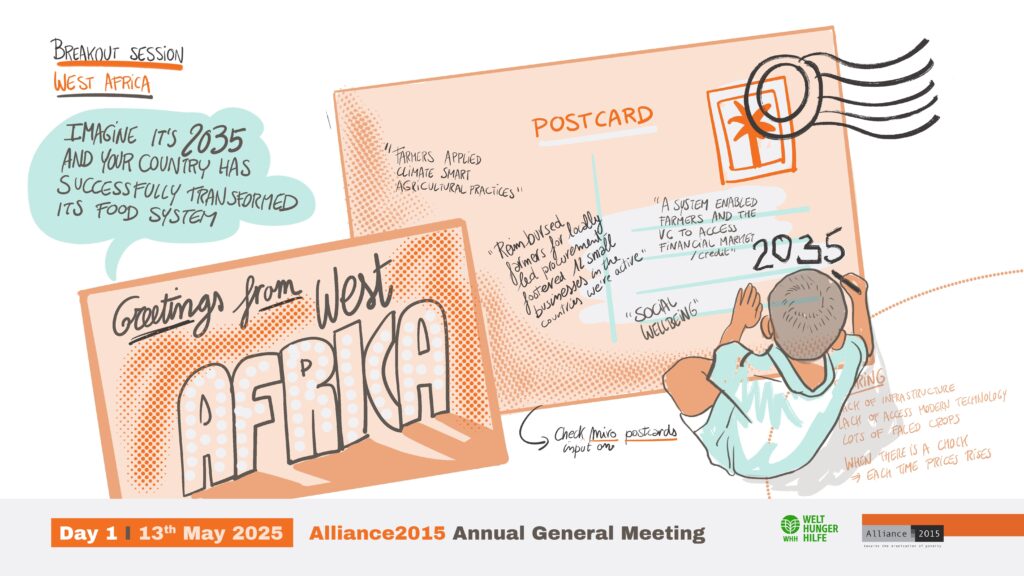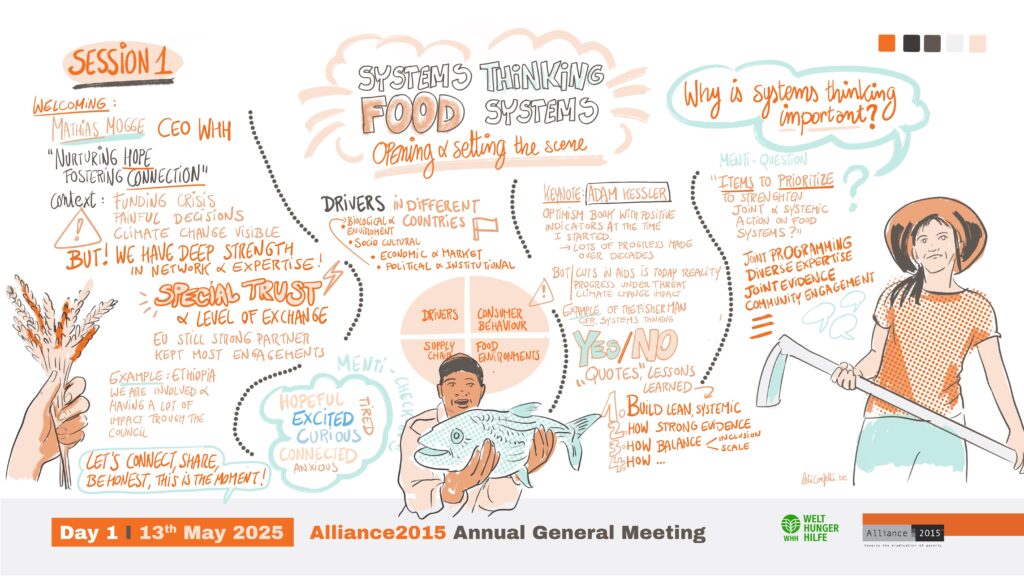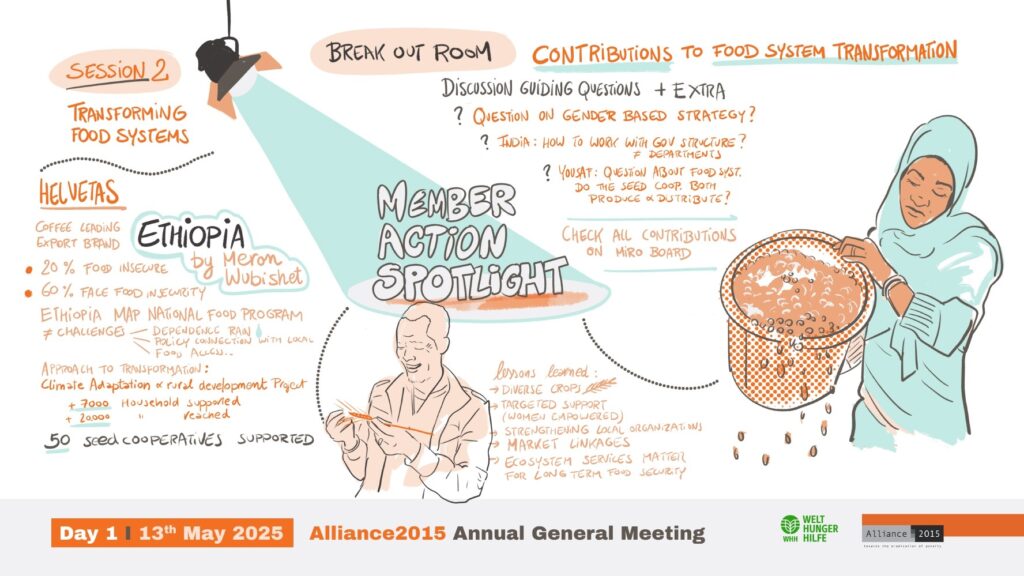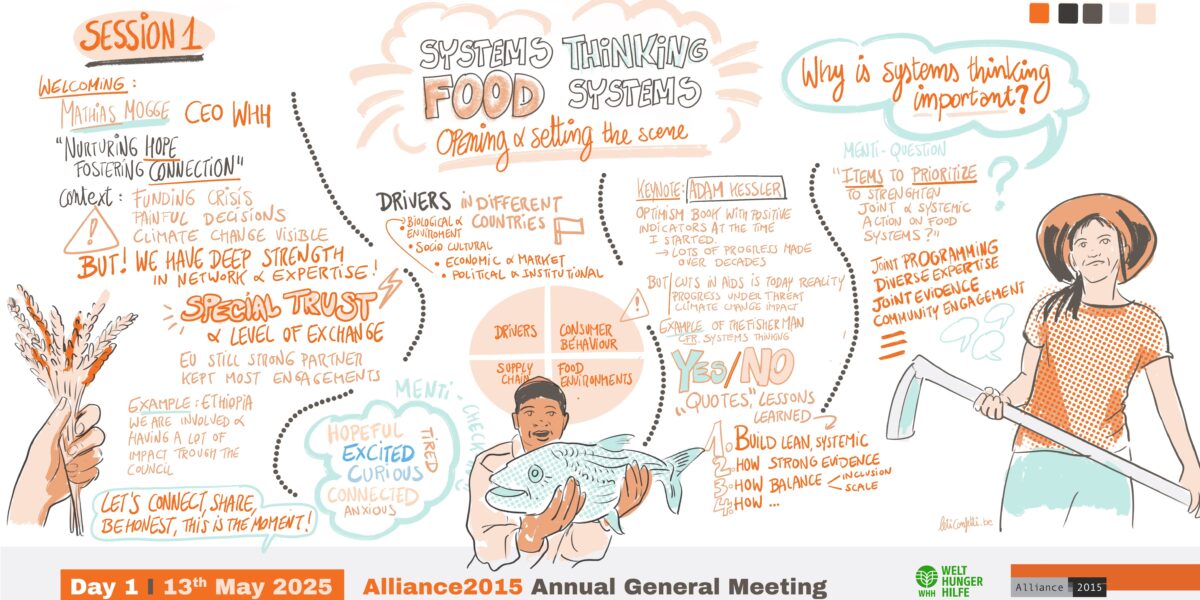Alliance2015 AGM 2025 – Final Report
Have a look at our joint key reflections
Overview
This report captures the collective insights, experiences, and recommendations from the Alliance2015 AGM 2025 sessions, with a strong focus on systemic change in food systems. Discussions centered on national/regional experiences (Ethiopia, Liberia, Latin America), member contributions, and forward-looking strategies for impact at global, regional, and local levels.
Future visions of food systems (Visioning Session)
Overview
Participants from Ethiopia, Liberia, and Latin America shared long-term visions for food systems by 2035. These outlined ideal states of resilience, inclusion, and sustainability across various contexts.
Key Reflections
- A common ambition for climate-smart, inclusive, and resilient systems.
- Strong emphasis on women, youth, and community-led governance.
- Diverse, nutritious diets and localized value chains are central goals.
- Peacebuilding and conflict sensitivity underpin effective transformation.
Workstreams / Action Points
- Use country visions to guide Alliance2015’s joint positioning and narrative.
- Foster mutual learning by comparing progress toward national visions.
- Build evidence and narratives around localised food systems transformation (Food Systems Transformation (FST) CoP will share their research and narratives).
- Strengthen collaborative knowledge sharing and documentation among our network (FST CoP).
- Foster inclusive public–private partnerships that promote enabling regulations and collaborative governance. Strategic engagement with the private sector can unlock innovative and sustainable solutions (FST CoP will disseminate guidance).

Challenges and learnings from the ground (Member Action Spotlight Session)
Overview
Session 7 focused on complex realities faced by members implementing food systems programming in Ethiopia, Liberia, and Latin America.
Key Reflections
- Common challenges include weak governance, climate vulnerability, limited access to markets, gender inequality, and knowledge gaps.
- Learnings highlight the need for:
- Women’s empowerment
- Capacity building
- Multisectoral and systemic approaches
- Local ownership and private sector engagement
- Data-informed and evidence-based interventions
Workstreams / Action Points
- Invest in inclusive adult learning (esp. for women).
- Deepen collaboration with research institutions and local NGOs (FST CoP will share their local NGOs mapping).
- Promote climate-resilient crops, appropriate mechanisation, and nutrition-sensitive agriculture.
- Advocate for harmonized inclusive policies and better coordination among ministries.
- Share systemic learnings across countries and embed them in programme design (FST CoP will hold a session on working across borders, to orient joint programming in cross-border areas).


Levers for systemic change
Overview
Across sessions, participants identified effective levers for influencing change at structural and operational levels.
Key Reflections
- Empowerment of women and youth as agents of transformation.
- Inclusion of marginalised groups (e.g., people with disabilities).
- Shift from service delivery to systems facilitation.
- Joint advocacy and coalition-building for enabling policies (Advocacy Group shall clarify advocacy issues pertaining to FST; Members shall reinforce internal connection between their Advocacy and Programs Departments to ensure relevant content contribution by the FST CoP to joint advocacy).
- Strengthening market systems, not just production.
Workstreams / Action Points
- Apply power analysis tools to rebalance value chains.
- Promote leadership and voice of women in farmers’ unions and policy forums.
- Scale context-appropriate technologies and digital innovations.
- Integrate local actors into joint planning and decision-making.
- Revive local food culture through campaigns and branding efforts.
Member collaboration & operationalising Alliance2015
Overview
The “Impact Goal Workshop” clarified ways Alliance2015 can move from coordination to deep collaboration for systems change.
Key Reflections
- There is a shared appetite to go beyond project-based collaboration.
- Joint programming, visibility, advocacy, and analysis are underleveraged.
- Localisation must move from rhetoric to action.
- A coherent, shared roadmap is essential for scale and impact.
Workstreams / Action Points
- Live Alliance2015 values throughout the programme cycle – from needs assessments to implementation.
- Conduct joint country mapping and needs assessments.
- Establish mechanisms for regular joint analysis and cross-learning.
- Build capacity on systems thinking, facilitation, and multi-stakeholder engagement (FST CoP will start from a pilot workshop for future replication, towards more intentionally shared capacity-building opportunities).
- Promote joint branding, advocacy products.

Strategic engagement and policy influence
Overview
Participants explored Alliance2015’s potential to shape policy and investment environments at national, regional, and global levels.
Key Reflections
- Advocacy must be informed by field evidence and conducted jointly.
- Stronger engagement with donors and multilateral processes is needed.
- Governments are not just partners but enablers for systemic change.
- Policy influence must be coordinated and based on clear value-add.
Workstreams / Action Points
- Develop joint advocacy strategies (Advocacy Group and Task Forces to continue advocating on food security, livelihoods and resilience beyond nutrition, also amid funding cuts; FST CoP should inform advocacy with evidence from the field).
- Support joint positioning towards traditional donors and engage with “non-traditional” donors (philanthropies, private sector) – (Hub and Fundraising and Partnership Group (FPG)).
- Elevate success stories and lessons from localisation and private sector collaboration.
Internal strengthening for external impact
Overview
To meet their ambition, Alliance2015 members acknowledged the need for internal coherence, coordination, and shared learning.
Key Reflections
- Collaboration must be intentional, not incidental.
- Knowledge management and learning frameworks need strengthening.
- Cost-effectiveness and sustainability require new operational models.
Workstreams / Action Points
- Develop common learning and impact measurement frameworks (FST CoP will discuss existing measurement frameworks and indicators to understand how to measure change beyond food production, integrate them and use the ones that have proven effective).
- Launch peer-learning opportunities (e.g., visits, joint training).
- Consider shared country presence or pooled resources for efficiency.
- Conduct an internal review of collaboration successes and bottlenecks (FPG).

Graphic recording credits: Grafik


